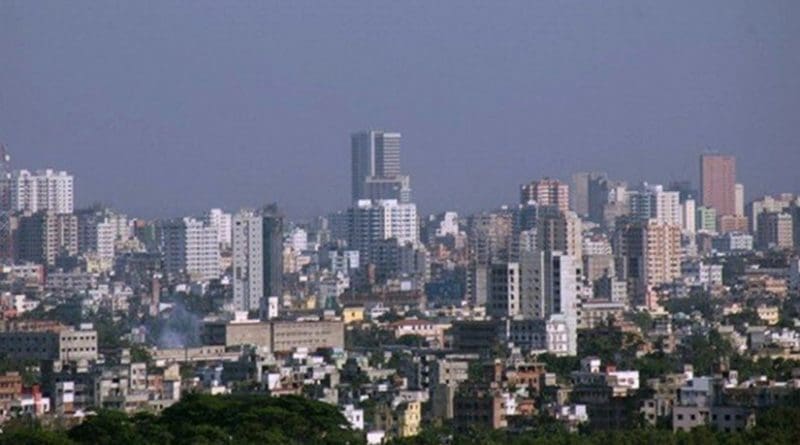Chinese Consortium Acquires 25 Percent Stake In Dhaka Stock Exchange
By BenarNews
By Sharif Khiam
A Chinese consortium will own a quarter of Bangladesh’s main stock market, officials said Tuesday, a day after the signing of a strategic partnership that formally rejected a rival bid from India.
The consortium, composed of the Shanghai and the Shenzhen stock exchanges, agreed to acquire 25 percent of the Dhaka Stock Exchange (DSE) during the signing of the agreement on Monday evening, officials said.
The Chinese offer underscored an expanding investment rivalry between China and India in Bangladesh during the past few years, according to analysts.
“Both countries have more influence in Bangladesh, and there’s an intense competition among them,” Bangladeshi economist Anu Muhammad told BenarNews. “There will be a political dimension in their economic competition.”
The signing took place months after a widely publicized rift between Bangladesh’s state regulatory agency and DSE officials over which bid to accept.
On Feb. 19, DSE officials announced that they had voted unanimously to accept the Chinese consortium’s offer to pay 22 taka (U.S. 26 cents) per share, which was sweetened with an additional offer of about $37 million in technical assistance.
“The price of the entire 25 percent stake is $53 million which was sold at $125 million with premium,” DSE Managing Director K.A.M. Majedur Rahman told Reuters on Tuesday.
As part of the offer to acquire 450 million shares, the Chinese consortium also requested just one seat on the DSE board, while India’s National Stock Exchange (NSE) had offered 15 taka (about 18 cents) per share and also asked for two board seats, bourse officials told BenarNews.
The signing of the agreement was repeatedly delayed, according to local media reports, after issues were raised by a national regulatory agency, the Securities and Exchange Commission (SEC).
Bangladeshi newspapers had reported that the Mumbai-based NSE tried to exert pressure on Dhaka officials into accepting its bid.
DSE, a public limited company, is one of the twin financial hubs of Bangladesh, alongside the Chittagong Stock Exchange. In 2018, the combined market capitalization of listed companies on the Dhaka bourse stood at more than U.S. $51.42 billion.
On the other hand, Shanghai and Shenzhen are among the world’s top stock exchanges with about $3.5 trillion and $2.2 trillion market capitalization, respectively.
DSE’s courting of foreign investment forms part of its demutualization process, which was approved by Bangladeshi authorities in 2013, local reports said. When a stock exchange is demutualized, it becomes a for-profit entity.
The demutualization plan included selling one-fourth of DSE’s stakes to mostly foreign entities in order to receive technological upgrades that would modernize the exchange, according to reports.
Millions of investors went bankrupt in November 2010 when Dhaka’s market crashed, with the exchange losing 1,800 points between December 2010 and January 2011. A three-member panel found heavy manipulation in the stock market and blamed the market regulator for failing to control the crisis, reports said.
‘China is the new friend’
A.B. Mirza Azizul Islam, a local economist, said the economic competition in his country between Beijing and New Delhi was “good” for Bangladesh, which has maintained a steady growth rate of 6 percent annually for about a decade based on its strong garments industry.
“We have the opportunity to invest here by both of these influential countries,” he told BenarNews. “There is nothing to worry about an ongoing global or regional rivalry between China and India.”
However, the Chinese attempt to invest in the Dhaka stock market is in line with Beijing’s Belt and Road Initiative, a geopolitical strategy by Beijing to build a vast network of ports, railways and roads that would connect China to the region, Muhammad, the other economist said.
China’s massive infrastructure initiative involves a long-term strategy for economic expansion that would also lead to a quiet encirclement of India, China’s main rival in South Asia, according to political analysts.
“India is scared of it. They think that if China’s influence increases here, their economic-political dominance can become weak. That is why India’s reaction is so overt,” Muhammad told Benar.
After NSE’s failed bid for the Dhaka bourse, its CEO, Vikram Limaye, flew to Dhaka to lobby for the SEC to reject the Chinese consortium’s offer, according to local reports.
Bangladeshi Prime Minister Sheikh Hasina, during an interview with Indian journalists in February this year, sought to dampen what local newspapers had described as “diplomatic instability” created by the Sino-Indian competition.
The bilateral relationship between Dhaka and Beijing has been on the upswing after Chinese leader Xi Jinping visited Bangladesh in 2016, during which deals worth almost $15 billion were sealed.
“India has no reason to worry about China’s investment in Bangladesh,” Hasina said. “Indian friendship has passed the test of time and China is the new friend.”

